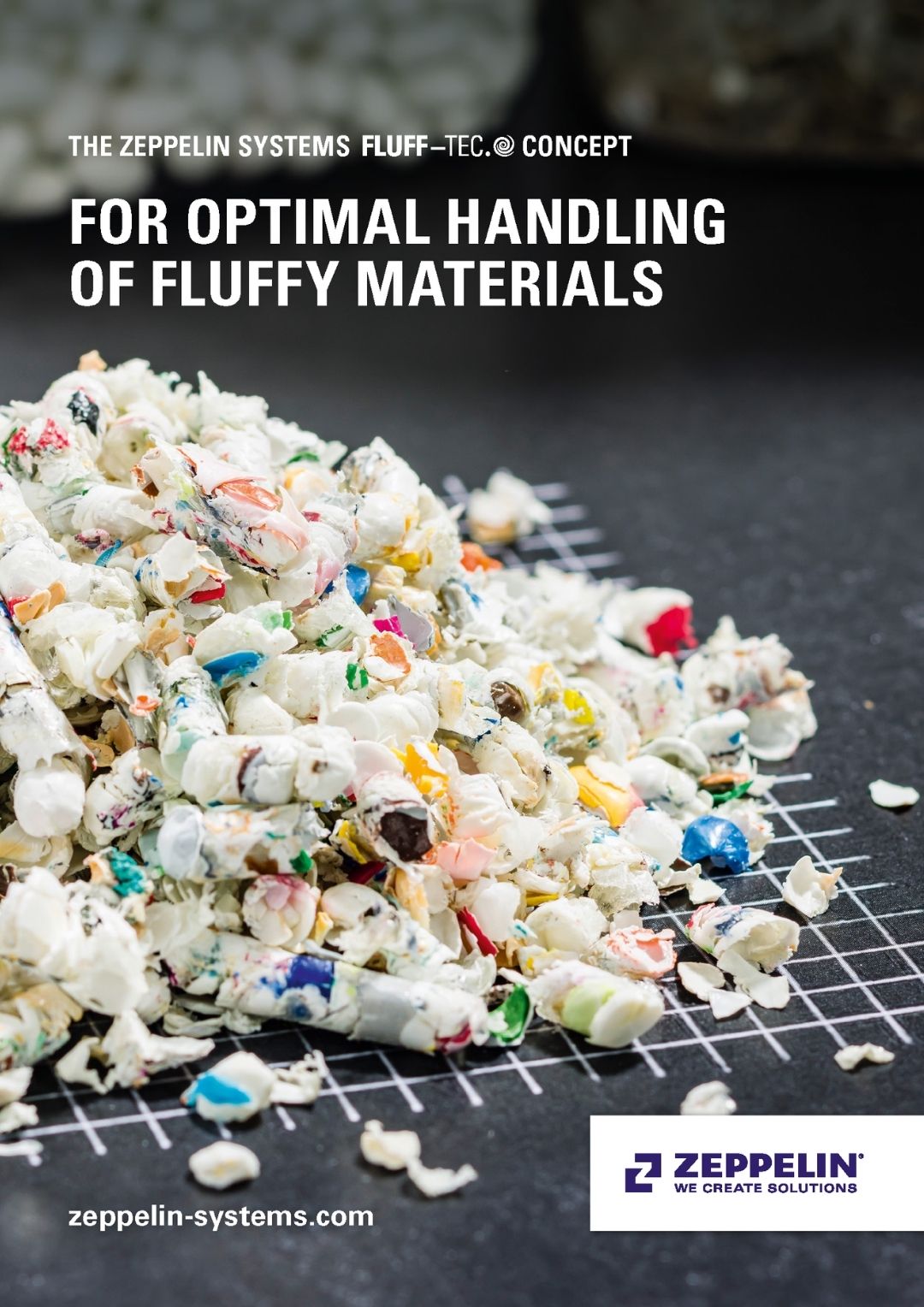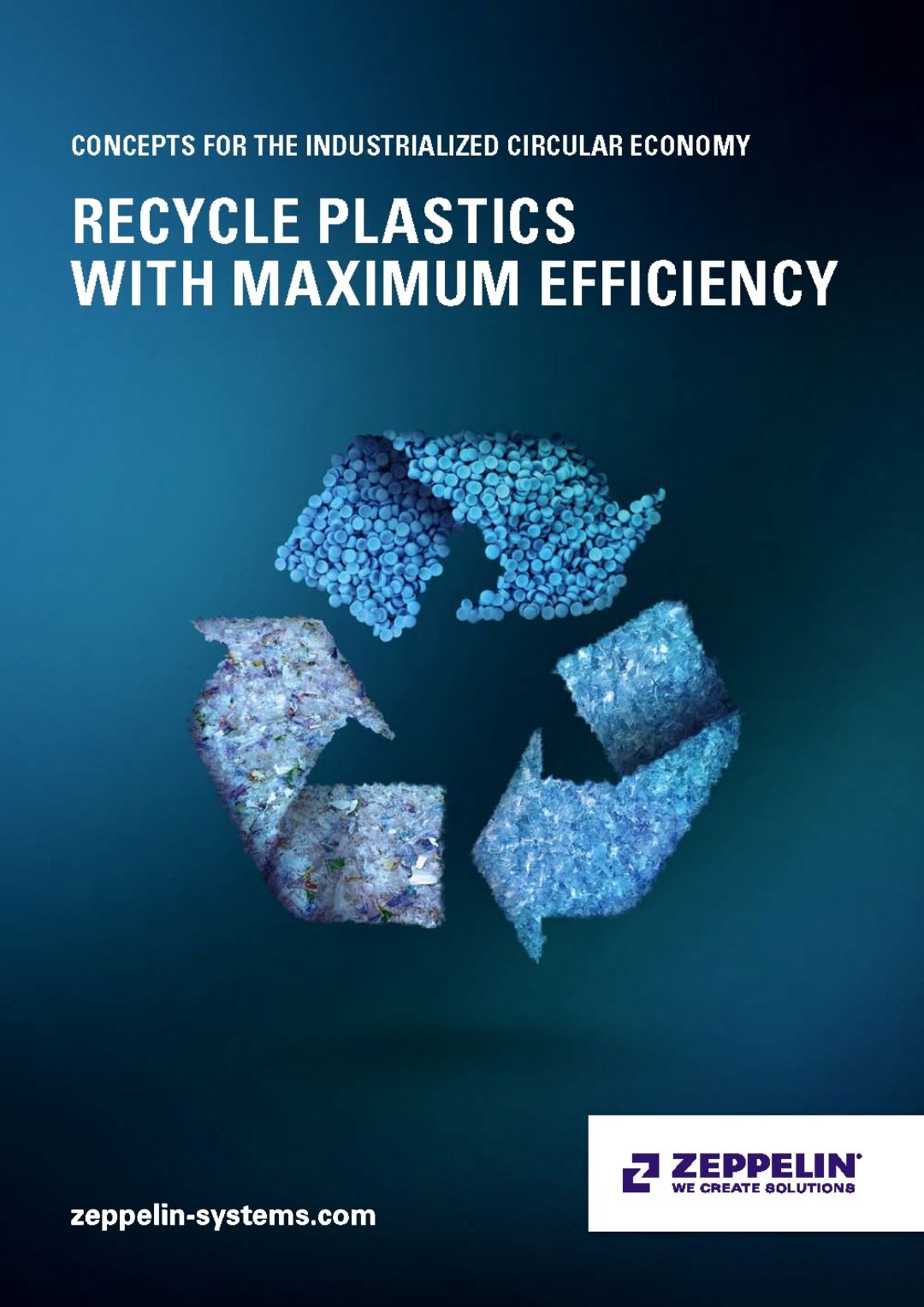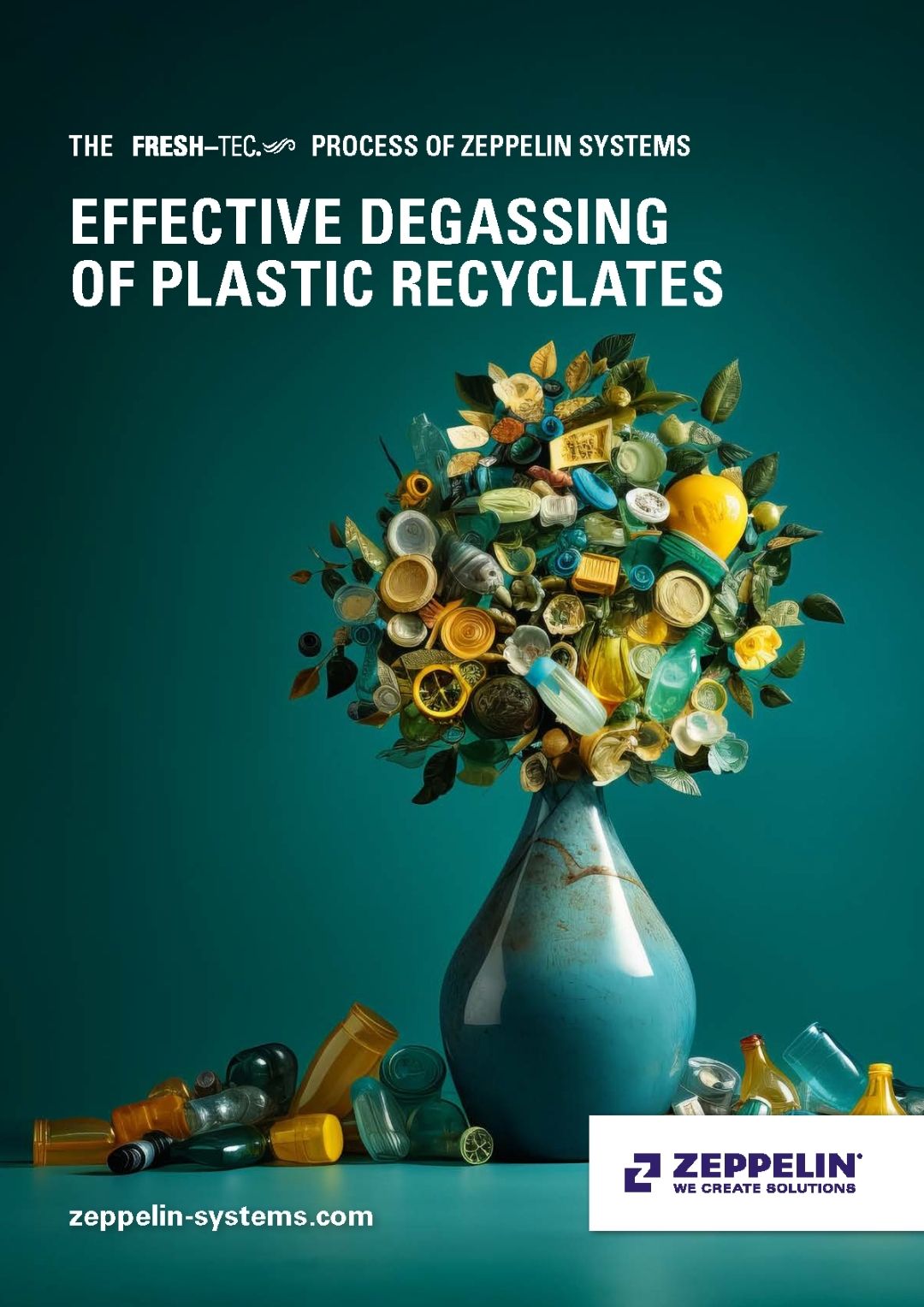
Plastic recycling
Concepts for the reprocessing of Plastics
Smart plant concepts for enhanced sustainability: recyclates as the key
Homogenization and smart product handling – for clean and sustainable production
Plastic recycling plays a crucial role on the path to a sustainable future.
However, the share of recyclates in plastic production to date is only 15 %. One reason for this is that recycled material often has an unpleasant odor, limiting its use in high-quality products. In addition, storage, homogenization, and precise dosing of flakes or fluffy materials during recyclate production present significant challenges. Zeppelin Systems’ forward-looking solutions enable efficient, high-quality processing of recyclates—whether from post-consumer or post-industrial sources. We industrialize and scale your recycling processes, actively conserving valuable resources. Let’s work together to shape a greener future! We Create Solutions!
Industries
Our customers’ recyclates have a wide range of applications—from packaging and automotive parts to everyday products.

Packaging
PET bottles are transformed into new bottles or packaging films; used HDPE plastics are repurposed into jerrycans and plastic caps; and recycled PP is made into yogurt cups, bottle closures, or plastic bags.

Textile industry
PET from plastic bottles can be recycled into polyester fibers and reused in clothing, sportswear, carpets, and other textiles.

Construction industry
Nowadays, PE and PVC recyclates are used in the manufacture of pipes, insulation materials, floor coverings, and roofing membranes.

Automotive industry
Recycled PP and PE plastics from post-consumer parts are already used in the manufacture of bumpers, door panels, interior components, and insulation materials.

Furniture manufacturing
For the manufacture of furniture—chairs, tables, garden furniture, and benches—recyclates are now being used. Even in designer furniture, high-quality composite plastics made from recyclates are increasingly employed.

Toy manufacturing
Toy manufacturers are increasingly using recycled plastics in the production of toys, such as building blocks, shovels, and dolls.

Agriculture
Recycled plastic films are now used in agriculture for greenhouses, mulch films, and irrigation systems.

Films

Flakes

PU-foam
vorteile
Our advantages for the industry
INdividual Solutions
All systems are precisely tailored to the specific requirements of your processes and materials.
Innovative technologies
We employ state-of-the-art technologies to ensure maximum energy and process efficiency, reliability, and sustainability in the handling of high-quality bulk materials.
Experience and expertise
Zeppelin Systems has decades of experience in plant engineering for the plastics industry, delivering economical, resource-conserving, and efficient solutions—whether for a new installation or the modernization of an existing brownfield facility.
Modular design
Existing plants can be scaled and adapted at any time to meet your requirements—whether it’s a new installation or the modernization of a brownfield facility.
Laboratory-scale equipment for your technical center
One example is the mobile laboratory deodorization unit DEO-L, in which process steps such as heating, degassing, and cooling can be simulated. The process parameters obtained provide a reliable basis for predicting deodorization performance in large-scale industrial plants.
Worldwide delivery and support
Our global presence ensures a comprehensive service and maintenance network around the world. Zeppelin offers its customers services across a wide range of areas—for example, first-class after-sales support following the design and completion of a plant.
High efficiency and cost savings
Optimized processes and automated workflows reduce operating costs and increase productivity.
Highest Quality standards
Use of premium materials and technologies that ensure long-term reliability and low maintenance costs.
Sustainability in focus
Plants engineered to reduce energy consumption and emissions support your environmental objectives.
Zeppelin Systems process steps
Process steps at Zeppelin Systems
Zeppelin Systems’ plants ensure efficient and safe recycling, with a particular focus on quality, energy efficiency, and cost‐effectiveness. Of course, all ATEX and relevant DIN standards are met. Every component is meticulously coordinated to enable seamless material flow, prevent feedstock variations, and reliably remove odors. Whether you’re processing PE, PP, PS, PET, PVC, or post-consumer materials, your feedstocks are in expert hands. As one of the leading plant engineers, we bring decades of experience in handling the widest range of bulk materials.

Compacting & agglomerating
The proportion of lighter materials—so-called fluffy materials from films, fleeces, or fibers—in packaging waste continues to increase. Before the recycling process, these must first be compacted, since even slight external mechanical stress or their own weight can alter their bulk-material form. Agglomerates can also lead to very high compressibility of the entire bulk. Therefore, densifying the plastic flakes before the actual recycling process creates a uniform, free-flowing mass that is easier to process. At the same time, this reduces the required storage volume—optimally preparing the material for subsequent homogenization and extrusion.

Storage & Discharge
Safe storage of recycling material is a critical task. With our Smart Storage solutions, Zeppelin Systems not only offers greater storage capacity compared to other options but also cost-effective and, above all, flexible concepts. Central to this are the Bolt-Tec silos, which are easy to install and adaptable for future developments. Intelligent discharge systems—such as vibrating floors or discharge screws—ensure that sufficient material is always available and that a controlled, constant bulk-material flow is maintained for further processing.

Homogenization
Mechanical mixers are frequently used for processing and homogenizing flakes, but they generate a high fine fraction and cause significant component wear. In contrast, Zeppelin Systems’ technology relies on gentle static homogenization. In our homogenizing silos, the material’s structure remains intact, and the creation of dust and noise is avoided. The thoughtfully engineered designs are strictly mass‐flow oriented and guarantee high mixing quality for volumes up to 300 m³. At the same time, the quality of the recycled material is improved by preventing fluctuations in the feed stream. This optimally prepares the bulk material for subsequent processing, whether for extrusion or packaging production.

Conveying
In a recycling facility, the efficiency of processing operations depends on the timely availability of feedstock and the smooth transfer of bulk materials between processing stages. Zeppelin Systems’ plants can reliably and gently convey high throughputs of up to 30 t/h over distances of up to 1 000 m. To ensure continuous material flow, we deploy sustainable conveying systems. Conveying distances and methods—such as pneumatic lean-phase conveying (Lean-Tec) or dense-phase conveying (Dense-Tec)—are tailored precisely to local conditions and the behavior of your materials.
For the dense-phase pneumatic transport of powders—like carbon black or silica—we offer various bypass systems that make slow, gentle conveying possible. All our conveying solutions guarantee operational safety, maximum cost-effectiveness, and product-preserving transport. In addition to protecting your product from external contamination, they also ensure dust-free conveying.

Deodorization
To increase the share of recycled plastics—especially when they are to be used in higher-value products—it is essential to effectively remove unpleasant odors. Zeppelin Systems’ continuously operating Fresh-TEC deodorization systems strip volatile organic compounds from tempered recyclate through air flushing. Special emphasis has been placed on process and energy efficiency. With Fresh-TEC deodorization plants, the recyclate content can be significantly increased, and premium-quality granules produced. Particularly exciting: FDA and EFSA certification create new, high-quality base materials for reuse, suitable even for applications in the cosmetics and food industries.
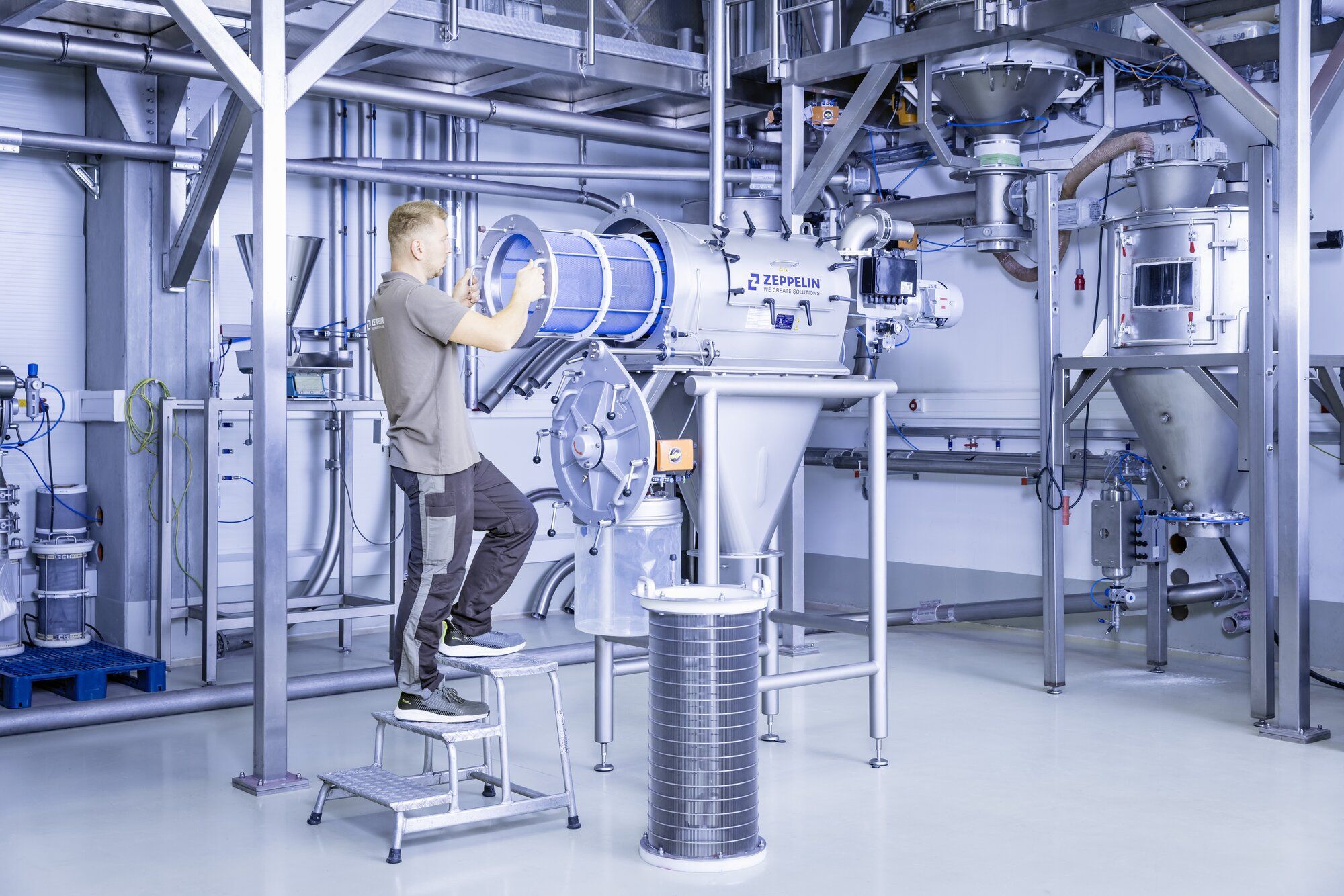
Separation & Classification
Sifters classify solids by particle size, density, or settling behavior. In the plastics industry, they are indispensable for removing contaminants, dust particles, fibers, and ‘angel hair’ from plastic granulates. Because recycled material often includes film remnants, Zeppelin Systems developed a dedicated film sifter. By screening out the film fraction in advance, you ensure process-reliable storage in the (mixing) silo. The separated film fraction is then compacted and fed to the extruder separately—guaranteeing the safety and purity of the recycled material.

Intelligent control for seamless processes
For producers, obtaining high-quality feedstock on the market is becoming increasingly difficult. They therefore must rely on multiple sources supplying base materials in varying forms, sizes, and bulk densities. To achieve excellent end products, the composition and blending of these materials must be actively controlled and managed. Zeppelin’s intelligent process control provides every tool needed for seamless operations. All processes can be monitored in real time, enabling immediate detection of potential errors and optimization for energy efficiency and cost-effectiveness. It also facilitates straightforward audit documentation and, if necessary, batch-traceable product recalls. Every plant can be supervised and controlled remotely, and Zeppelin systems can be flexibly adapted to changing requirements or expansions—without extensive system modifications. Moreover, the system is compatible with all standard control platforms.

Real-world trials in our technical center
At our Friedrichshafen technical center, users can test processes under realistic conditions to evaluate functionality and efficiency. Two large pilot plants for granulate, powder, and additives form the core of the facility, where trials are conducted at industrial scale. This enables determination of all relevant design parameters and the preparation of detailed test reports as the basis for plant conception. To achieve the best performance and efficiency for your process, the plant, its components, and operating modes are examined in full-scale tests until the optimum configuration is found. Innovative technologies such as Fresh-Tec® and Fluff-Tec® can also be trialed here. Data-driven decision support aids both design and operation.
Friedrichshafen also houses one of the world’s largest bulk-materials libraries, containing decades of our experts’ accumulated knowledge on handling bulk solids. Moreover, Zeppelin Systems maintains the largest global network of bulk-materials technical centers: in Kassel, mechanical process-engineering trials—especially mixing technology—for the plastics-processing and chemical industries are carried out; in Rödermark, the focus is on food-industry processes.
Need more details? Our contact person will be happy to assist you
Services
Discover our comprehensive range of services
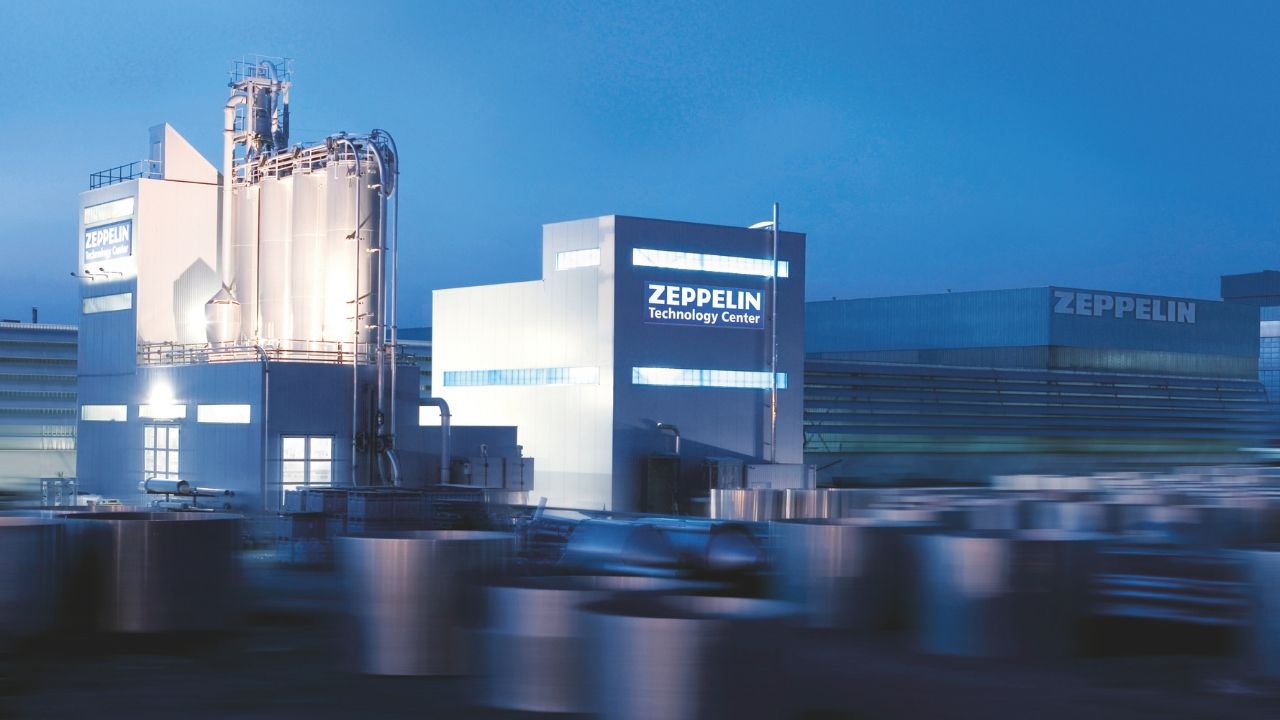
Zeppelin Technical Center
Industrial-scale testing
Testing is good; testing at a 1:1 scale under real-world conditions is even better. To support this, we have established optimal facilities at our Friedrichshafen technical center: based on your recipe and desired throughput, we identify the plant technology tailored to your needs — and test the complete system for you in live operation.
Go to technical center
Automation
Automation with foresight
Above all, your plant must do one thing: run and deliver. That’s why we provide you with reliable, professional service. Rely on our global service network for expert consultation and extremely fast spare-parts supply to minimize downtime. When needed, we’re also at your side digitally—from virtual troubleshooting to online-supported commissioning.
Go to automation solutions
Service
Service without compromise
In the 21st century, optimization often means automation. We ensure that your automation project is a complete success in terms of both efficiency and cost-effectiveness. To achieve this, we rely on cutting-edge control systems whose open architectures prepare you for the challenges of tomorrow—and beyond.
Go to servicesResources
Brochures for download
Explore more from the Zeppelin Systems portfolio
Products
© 2026 Zeppelin Systems GmbH
